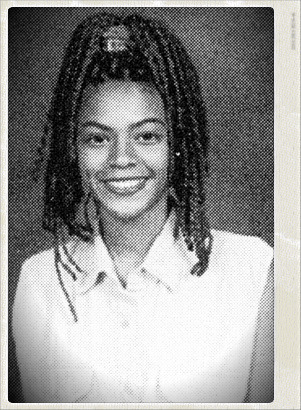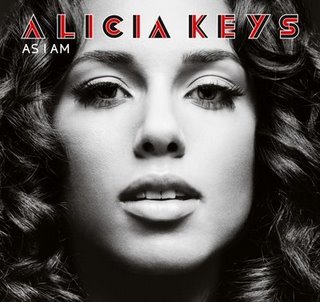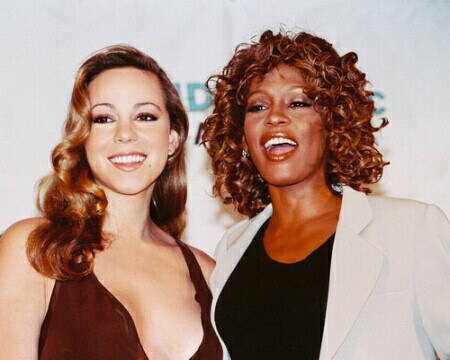Chartwatch extra: from Mills Bros to Jay-Z
Feb 12, 2010 15:01:27 GMT -5
Post by Deleted on Feb 12, 2010 15:01:27 GMT -5
Chart Watch Extra: Jay-Z Meets The Mills Brothers
Posted 53 minutes ago by Paul Grein in Chart Watch
To help celebrate Black History Month, here's a quick look at African American artists who have made history on the Billboard charts, from the Mills Brothers to Jay-Z. I also show key achievements by black artists at the Academy Awards and the Grammy Awards.
Of course, black artists are so central to the history of popular music that the idea of spotlighting them in this way is probably a little dated. Still, it's a useful way of conveying information about black trailblazers--which is the whole point of Black History Month.
Michael Jackson has set so many records that I could fill up a column listing just his achievements. (In fact, I did last June, right after he died.) Combining his solo recordings and his hits with the Jackson 5, he has had more top 10 singles on the Hot 100 (39) and more top 40 singles (60) than any other black artist.
In the same way, combining her solo recordings and her Supremes releases, Diana Ross has had more top 40 albums on
The Billboard 200 (34) than any other black artist.
From the start, black artists have helped set the pace in popular music. The King Cole Trio was not only the first black artist to land a #1 album, but the first artist, period. The famed jazz trio was #1 on the very first album chart in March 1945.
This has continued, and accelerated, in recent decades. In 1993, Whitney Houston's The Bodyguard soundtrack became the first album in the Nielsen/SoundScan era to sell 1 million copies in one week. In 2003, rapper DMX became the first artist ever to top
The Billboard 200 with its first five albums.
It has been a similar story on the Hot 100. In 1984, Michael Jackson became the first artist to pull seven top 10 singles from one album. In 1991, his sister Janet Jackson became the first artist to pull seven top five singles from one album. And with "One Sweet Day" in 1996, Mariah Carey and Boyz II Men became the first act since 1947 to have the #1 pop hit for 16 weeks.
Here are some (but by no means all) important records set by black artists over the past seven decades. The artist's name is immediately followed by the milestone they set or the record they hold.
The King Cole Trio: the first artist to land a #1 album. The (mostly) instrumental trio's album, titled The King Cole Trio, featured Nat "King" Cole singing on three of its eight tracks. Natalie Cole included one of these songs, "It's Only A Paper Moon," on her 1991 tribute album, Unforgettable With Love.
Ray Charles: the black artist with the longest span of #1 albums. Charles first topped The Billboard 200 in June 1962 with the genre-bending Modern Sounds In Country And Western Music. He last topped it 42 years and nine months later, in March 2005, with Genius Loves Company.
Stevie Wonder: the first black artist to enter The Billboard 200 at #1. Wonder achieved the feat in October 1976 with Songs In The Key Of Life. This was a very rare occurrence at the time (only Elton John had done it previously). The album logged 14 weeks at #1 and spawned back-to-back #1 singles, "I Wish" and "Sir Duke."
Jay-Z: the black artist with the most #1 albums (11). Jay-Z first topped The Billboard 200 in October 1998 with Vol. 2...Hard Knock Life. He scored most recently in September with The Blueprint 3. His tally includes collaborations with R. Kelly and Linkin Park.
Michael Jackson: the black artist with the most weeks at #1 on the album chart (51). Also: the black artist with the longest run at #1 with any one album. Thriller rang up 37 weeks at #1 in 1983 and 1984. Also: the black artist with the longest run in the top 10 with any one album. Thriller logged 78 weeks in the top 10. (See The Fine Print below.)
Johnny Mathis: the black artist with the most top 10 albums (16). Also: the black artist with the longest run on The Billboard 200 with any one album. Mathis' 1958 album Johnny's Greatest Hits was a chart fixture for 490 weeks. Also: the black artist with the most chart albums (75, including collaborations with Deniece Williams and Henry Mancini). (This count includes albums that made the Christmas Albums chart.)
The Mills Brothers: The first black artist to land a #1 single (following the introduction of the weekly Best Sellers chart in July 1940). The beloved family vocal group scored in November 1943 with "Paper Doll," which was #1 for 12 weeks. They returned to the top spot with "You Always Hurt The One You Love" and "The Glow-Worm."
Diana Ross and Mariah Carey: The black artists with the most career #1 singles (18 each). Ross' tally includes 12 hits with the Supremes, one collaboration with Lionel Richie and five solo hits. Carey's tally includes collaborations with Trey Lorenz, Boyz II Men, Jay-Z and Joe & 98 Degrees).
Mariah Carey: the black artist with the most weeks at #1 on the Hot 100 (79). The biracial Carey (her father was of Afro-Venezuelan descent) has had #1 hits stretching from 1990's "Vision Of Love" to 2008's "Touch My Body."
James Brown: The black artist with the most chart singles (107). (This count combines 94 songs that made the Hot 100 and 13 that made the Bubbling Under list.) The Godfather of Soul's hits extend from 1958's "Try Me" to 1986's "Gravity." Only three were collaborations (with Vicki Anderson, Bobby Byrd and Lyn Collins).
Isaac Hayes: the first black songwriter to win an Academy Award for Best Original Song. Hayes triumphed in April 1972 with the funky, yet classy, "Theme From Shaft." The song was so undeniably great that even the conservative Hollywood music establishment had to give it its due.
Prince: the first black composer to win an Academy Award for either Best Original Score or Best Original Song Score. Prince won the latter prize in March 1985 for Purple Rain. His song score included four top 10 hits, "When Doves Cry," "Let's Go Crazy," "Purple Rain" and "I Would Die 4 U."
Count Basie and Ella Fitzgerald: the first black artists to win Grammy Awards. Each won two trophies at the inaugural presentation in May 1959. Count Basie won two Grammys for his album Basie. Fitzgerald won one each for her albums Ella Fitzgerald Sings The Irving Berlin Song Book and Ella Fitzgerald Sings The Duke Ellington Song Book.
Quincy Jones: the black artist with the most Grammy Awards (27). Jones won his first Grammy in May 1964 for arranging Count Basie's "I Can't Stop Loving You." He claimed his most recent one in February 2002 for his spoken word album, Q-The Autobiography Of Quincy Jones.
Aretha Franklin: the first artist to win Grammys eight years in a row. Franklin won for Best R&B Vocal Performance, Female every year from 1967 through 1974, a period in which she clinched her title as the Queen of Soul. Her winning records included such her definitive version of Otis Redding's "Respect" and her soul gospel take on Simon & Garfunkel's "Bridge Over Troubled Water."
The 5th Dimension: the first black artist to win a Grammy for Record of the Year. The pop quintet won in February 1968 for the effervescent "Up-Up And Away." They won again two years later for "Aquarius/Let The Sunshine In."
Billy Preston: the first black artist to win a Grammy for Album of the Year. Preston won for his work on the all-star benefit album, The Concert For Bangla Desh, which took the honor in March 1973. The following year, Stevie Wonder became the first black artist to win Album of the Year for an album of his own, Innervisions.
Natalie Cole: the first black artist to win a Grammy for Best New Artist. Cole won in February 1976, on the heels of her ebullient breakthrough smash, "This Will Be." (That same year, she snapped Aretha Franklin's eight-year winning streak for Best R&B Vocal Performance, Female.)
Michael Jackson and Lionel Richie: the first black songwriters to win a Grammy for Song of the Year. The pair won in February 1986 for co-writing the humanitarian anthem "We Are The World."
Duke Ellington: the first black artist to win a Grammy Lifetime Achievement Award. The famed composer and bandleader (the subject of Stevie Wonder's tribute "Sir Duke") received the honor in 1966. Two years later, Ellington and his long-time collaborator, Billy Strayhorn (who died in 1967) became the first black musicians to receive a Grammy Trustees Award.
The Fine Print: If catalog albums had been eligible for the Billboard 200 throughout 2008 and 2009, there would be a few changes in Michael Jackson's stats. His tally of weeks at #1 would jump from 51 to 57. Also, his career total of top 10 albums (combining Jackson 5 and solo releases) would jump from 14 to 16, putting him in a tie with Johnny Mathis for the most by a black artist. Finally, the number of weeks that Thriller appeared in the top 10 would jump from 78 to 91.
Posted 53 minutes ago by Paul Grein in Chart Watch
To help celebrate Black History Month, here's a quick look at African American artists who have made history on the Billboard charts, from the Mills Brothers to Jay-Z. I also show key achievements by black artists at the Academy Awards and the Grammy Awards.
Of course, black artists are so central to the history of popular music that the idea of spotlighting them in this way is probably a little dated. Still, it's a useful way of conveying information about black trailblazers--which is the whole point of Black History Month.
Michael Jackson has set so many records that I could fill up a column listing just his achievements. (In fact, I did last June, right after he died.) Combining his solo recordings and his hits with the Jackson 5, he has had more top 10 singles on the Hot 100 (39) and more top 40 singles (60) than any other black artist.
In the same way, combining her solo recordings and her Supremes releases, Diana Ross has had more top 40 albums on
The Billboard 200 (34) than any other black artist.
From the start, black artists have helped set the pace in popular music. The King Cole Trio was not only the first black artist to land a #1 album, but the first artist, period. The famed jazz trio was #1 on the very first album chart in March 1945.
This has continued, and accelerated, in recent decades. In 1993, Whitney Houston's The Bodyguard soundtrack became the first album in the Nielsen/SoundScan era to sell 1 million copies in one week. In 2003, rapper DMX became the first artist ever to top
The Billboard 200 with its first five albums.
It has been a similar story on the Hot 100. In 1984, Michael Jackson became the first artist to pull seven top 10 singles from one album. In 1991, his sister Janet Jackson became the first artist to pull seven top five singles from one album. And with "One Sweet Day" in 1996, Mariah Carey and Boyz II Men became the first act since 1947 to have the #1 pop hit for 16 weeks.
Here are some (but by no means all) important records set by black artists over the past seven decades. The artist's name is immediately followed by the milestone they set or the record they hold.
The King Cole Trio: the first artist to land a #1 album. The (mostly) instrumental trio's album, titled The King Cole Trio, featured Nat "King" Cole singing on three of its eight tracks. Natalie Cole included one of these songs, "It's Only A Paper Moon," on her 1991 tribute album, Unforgettable With Love.
Ray Charles: the black artist with the longest span of #1 albums. Charles first topped The Billboard 200 in June 1962 with the genre-bending Modern Sounds In Country And Western Music. He last topped it 42 years and nine months later, in March 2005, with Genius Loves Company.
Stevie Wonder: the first black artist to enter The Billboard 200 at #1. Wonder achieved the feat in October 1976 with Songs In The Key Of Life. This was a very rare occurrence at the time (only Elton John had done it previously). The album logged 14 weeks at #1 and spawned back-to-back #1 singles, "I Wish" and "Sir Duke."
Jay-Z: the black artist with the most #1 albums (11). Jay-Z first topped The Billboard 200 in October 1998 with Vol. 2...Hard Knock Life. He scored most recently in September with The Blueprint 3. His tally includes collaborations with R. Kelly and Linkin Park.
Michael Jackson: the black artist with the most weeks at #1 on the album chart (51). Also: the black artist with the longest run at #1 with any one album. Thriller rang up 37 weeks at #1 in 1983 and 1984. Also: the black artist with the longest run in the top 10 with any one album. Thriller logged 78 weeks in the top 10. (See The Fine Print below.)
Johnny Mathis: the black artist with the most top 10 albums (16). Also: the black artist with the longest run on The Billboard 200 with any one album. Mathis' 1958 album Johnny's Greatest Hits was a chart fixture for 490 weeks. Also: the black artist with the most chart albums (75, including collaborations with Deniece Williams and Henry Mancini). (This count includes albums that made the Christmas Albums chart.)
The Mills Brothers: The first black artist to land a #1 single (following the introduction of the weekly Best Sellers chart in July 1940). The beloved family vocal group scored in November 1943 with "Paper Doll," which was #1 for 12 weeks. They returned to the top spot with "You Always Hurt The One You Love" and "The Glow-Worm."
Diana Ross and Mariah Carey: The black artists with the most career #1 singles (18 each). Ross' tally includes 12 hits with the Supremes, one collaboration with Lionel Richie and five solo hits. Carey's tally includes collaborations with Trey Lorenz, Boyz II Men, Jay-Z and Joe & 98 Degrees).
Mariah Carey: the black artist with the most weeks at #1 on the Hot 100 (79). The biracial Carey (her father was of Afro-Venezuelan descent) has had #1 hits stretching from 1990's "Vision Of Love" to 2008's "Touch My Body."
James Brown: The black artist with the most chart singles (107). (This count combines 94 songs that made the Hot 100 and 13 that made the Bubbling Under list.) The Godfather of Soul's hits extend from 1958's "Try Me" to 1986's "Gravity." Only three were collaborations (with Vicki Anderson, Bobby Byrd and Lyn Collins).
Isaac Hayes: the first black songwriter to win an Academy Award for Best Original Song. Hayes triumphed in April 1972 with the funky, yet classy, "Theme From Shaft." The song was so undeniably great that even the conservative Hollywood music establishment had to give it its due.
Prince: the first black composer to win an Academy Award for either Best Original Score or Best Original Song Score. Prince won the latter prize in March 1985 for Purple Rain. His song score included four top 10 hits, "When Doves Cry," "Let's Go Crazy," "Purple Rain" and "I Would Die 4 U."
Count Basie and Ella Fitzgerald: the first black artists to win Grammy Awards. Each won two trophies at the inaugural presentation in May 1959. Count Basie won two Grammys for his album Basie. Fitzgerald won one each for her albums Ella Fitzgerald Sings The Irving Berlin Song Book and Ella Fitzgerald Sings The Duke Ellington Song Book.
Quincy Jones: the black artist with the most Grammy Awards (27). Jones won his first Grammy in May 1964 for arranging Count Basie's "I Can't Stop Loving You." He claimed his most recent one in February 2002 for his spoken word album, Q-The Autobiography Of Quincy Jones.
Aretha Franklin: the first artist to win Grammys eight years in a row. Franklin won for Best R&B Vocal Performance, Female every year from 1967 through 1974, a period in which she clinched her title as the Queen of Soul. Her winning records included such her definitive version of Otis Redding's "Respect" and her soul gospel take on Simon & Garfunkel's "Bridge Over Troubled Water."
The 5th Dimension: the first black artist to win a Grammy for Record of the Year. The pop quintet won in February 1968 for the effervescent "Up-Up And Away." They won again two years later for "Aquarius/Let The Sunshine In."
Billy Preston: the first black artist to win a Grammy for Album of the Year. Preston won for his work on the all-star benefit album, The Concert For Bangla Desh, which took the honor in March 1973. The following year, Stevie Wonder became the first black artist to win Album of the Year for an album of his own, Innervisions.
Natalie Cole: the first black artist to win a Grammy for Best New Artist. Cole won in February 1976, on the heels of her ebullient breakthrough smash, "This Will Be." (That same year, she snapped Aretha Franklin's eight-year winning streak for Best R&B Vocal Performance, Female.)
Michael Jackson and Lionel Richie: the first black songwriters to win a Grammy for Song of the Year. The pair won in February 1986 for co-writing the humanitarian anthem "We Are The World."
Duke Ellington: the first black artist to win a Grammy Lifetime Achievement Award. The famed composer and bandleader (the subject of Stevie Wonder's tribute "Sir Duke") received the honor in 1966. Two years later, Ellington and his long-time collaborator, Billy Strayhorn (who died in 1967) became the first black musicians to receive a Grammy Trustees Award.
The Fine Print: If catalog albums had been eligible for the Billboard 200 throughout 2008 and 2009, there would be a few changes in Michael Jackson's stats. His tally of weeks at #1 would jump from 51 to 57. Also, his career total of top 10 albums (combining Jackson 5 and solo releases) would jump from 14 to 16, putting him in a tie with Johnny Mathis for the most by a black artist. Finally, the number of weeks that Thriller appeared in the top 10 would jump from 78 to 91.




















 @ people saying Mariah is white. Her father was black, she's half-black.
@ people saying Mariah is white. Her father was black, she's half-black.